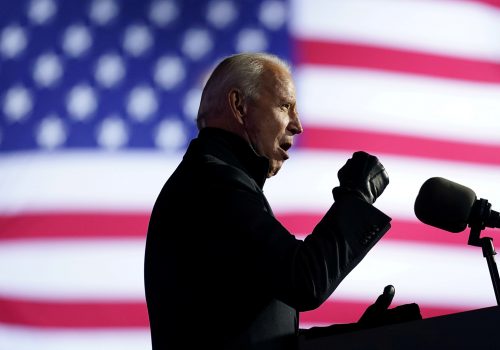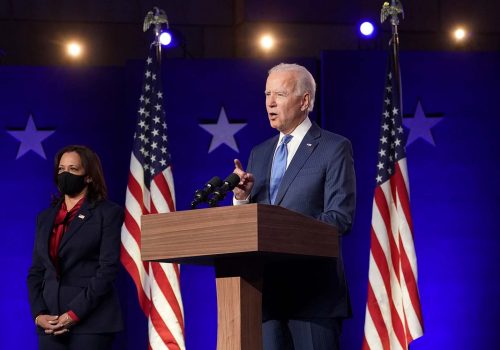FAST THINKING: How Europe will react to a Biden presidency
Read the full reaction from our experts
JUST IN
After weeks of sleepless nights, Europe finally knows the victor in the US presidential election. While many European leaders may hope for a smoother relationship with President-elect Joe Biden—compared to a rocky four years with President Donald Trump—will both sides of the Atlantic be able to smooth over their differences?
TODAY’S EXPERT REACTION COURTESY OF
- Benjamin Haddad: Europe analyst and director of the Atlantic Council’s Future Europe Initiative
- Defne Arslan: Economist and director of the Atlantic Council in Turkey program
- Christopher Preble: Foreign-policy scholar and co-director of the New American Engagement Initiative in the Atlantic Council’s Scowcroft Center for Strategy and Security
Europe eyes a close result
- Americans weren’t the only ones glued to the news this week, Ben explains. For Biden, “the narrow result should inspire humility when engaging allies,” he cautions, as Europeans will be acutely aware of how close Trump came to a second term.
- Ben predicts that President-elect Biden will find a very different Europe from the one he worked with as vice president just four years ago. “The Biden administration should acknowledge that the past years have awakened Europeans to the necessity of building their own strategic identity and progressively reducing some of their dependence on US power, especially in their own neighborhood.”
- While US policymakers have often butted heads with their European counterparts over spending more money on defense, Chris suggests that this dynamic may be changing. Without a clear electoral repudiation of Trump, some US allies may “modestly increase their own military spending as an insurance policy against US abandonment.”
Subscribe to Fast Thinking email alerts
Sign up to receive rapid insight in your inbox from Atlantic Council experts on global events as they unfold.

Chance for a Turkey reset?
- Defne imagines where relations between Ankara and Washington could head next, as the NATO allies have found themselves at odds over issues like Syria and Turkey’s purchase of a Russian missile-defense system. President Trump and Turkish President Recep Tayyip Erdoğan were able to maintain a positive personal relationship, but Biden is also no stranger to Turkey, having traveled there as vice president on several occasions, “including for talks at even tougher times such as after the failed coup attempt” against Erdogan in 2016.
- In dealing with Turkey, she advises, Biden should keep in mind not just the outstanding issues between the two countries, but also that Turkey has NATO’s second-largest army behind the United States and can still be “an integral partner in balancing Russian and Iranian influence in the region.”
A welcome change in tone
- European leaders should be prepared for some dramatic US U-turns once Biden takes office in January, Chris predicts. Although progress may be slowed by a narrowly-divided Congress, Biden could quickly try to “reenter the Joint Comprehensive Plan of Action with Iran, resume US membership in the World Health Organization, and recommit the United States to meeting its obligations within the Paris Climate Accord,” smoothing over many of the areas of transatlantic disagreement from recent years.
- Just the change in tone could be dramatic, he adds. Biden’s first moves would signal “a greater willingness to take others’ interests into account—something that Donald Trump’s ‘America First’ approach explicitly did not.”
- But Ben reminds us that this won’t mean Europe and the United States will suddenly operate in lockstep. “Disagreements will linger,” he cautions, especially on “trade and digital regulation.” European leaders will welcome, however, that these topics will now “be addressed through constructive dialogue rather than confrontation.”
Further reading
Sat, Nov 7, 2020
Joe Biden just won the presidency: What does that mean for America’s role in the world?
Elections 2020 By
Atlantic Council experts weigh in on what the outcome of the 2020 election means for US foreign policy and America’s role in the world.
Sat, Nov 7, 2020
FAST THINKING: What Biden’s victory means for America’s allies
Fast Thinking By
Joe Biden has amassed enough votes to become the next president of the United States, on a platform that included restoring America’s fraying relationships around the world. Here's what the countries on the other end of those relationships can expect next.
Wed, Nov 4, 2020
What America’s allies and adversaries will make of the 2020 election
Elections 2020 By William F. Wechsler
Rather than provide an opportunity to “bind up the nation’s wounds” once again, the election has instead clearly confirmed the deep divisions in American society by class, region, race, gender, religion, and culture. No matter who wins the presidency, the result will likely be a nation increasingly focused inward on the implications of these divisions.
Image: Flags of NATO member countries flutter at the Alliance headquarters in Brussels, Belgium, February 28, 2020. REUTERS/Francois Lenoir


